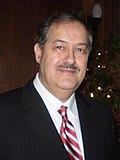| Inmate Name | Register Number | Photo | Status | Details |
|---|
| Jordan Belfort [6] | 56213-053 |  | Released from prison in April 2006, served 22 month sentence | American stockbroker and the subject of the 2013 film The Wolf of Wall Street, based on Belfort's 2007 memoir of the same name . On July 18, 2003, he was sentenced to 22 months in federal prison for securities fraud and money laundering, and ordered to pay $110 million in restitution to clients he defrauded. While at Taft, he was the cellmate of Tommy Chong, who Bellfort credits for having helped him write his memoirs. |
| Don Blankenship [7] | 12393-088 |  | Released from prison on May 10, 2017, served 1 year sentence | American business executive and perennial candidate. CEO of Massey Energy Company from 2000 until 2010, when an explosion at Massey's Upper Big Branch Mine resulted in the deaths of 29 workers. On December 3, 2015, he was convicted of conspiracy to violate mine safety and health standards. On May 12, 2016, he was sentenced to 1 year in federal prison, and forced to pay a $250,000 fine. He was released from prison on May 10, 2017. [8] |
| Tommy Chong [6] | 07798-068 |  | Released from prison on July 7, 2004, served nine month sentence | Canadian-American comedian and actor. In 2003, he was arrested as part of two American investigations, Operation Pipe Dreams and Operation Headhunter, which involved thousands of DEA agents. On October 8, 2003 was sentenced to nine months in federal prison and forced to pay a $20,000 fine and $103,514 in forfeiture for having sold drug paraphernalia through his website Nice Dreams. |
| Vincent Sennen Garcia [9] | 95309-198 |  | Released from prison on April 10, 2007, served three month sentence | American surfer. In October 2006, he was convicted of tax fraud, having failed to report $471,000 in winnings between 1996 and 2001. On January 12, 2007, he was sentenced to three months in federal prison, followed by seven months of house arrest. He was released from prison on April 10, 2007. |
| Vic Kohring [10] | 15406-006 | | Released from prison on June 11, 2009, served one year sentence | American politician and former member of the Alaska House of Representatives from 1995 to 2003, and again from 2003 to his resignation in 2007. In May 2007, he was indicted in the ongoing Alaska political corruption probe for having solicited and accepted bribes from VECO Corporation. In May 2008, he was sentenced to three and a half years in federal prison on federal bribery charges. His conviction was later vacated to one year in a plea deal, and he was released from prison on June 11, 2009. |
| Rudy Kurniawan [11] | 62470-112 | | Deported to Indonesia by ICE on April 8, 2021, finished shortened sentence | Indonesian fraudster, indicted on several counts of wire fraud, mail fraud and wine fraud. Sentenced on August 7, 2014 to ten years in federal prison. He was released from prison on November 7, 2020, and handed over to the custody of Immigration and Customs Enforcement. He was formally deported to Indonesia on April 8, 2021 |
| Richard Pinedo [12] | 35254-016 | | Released from custody on May 13, 2019, served six month sentence | American man from Santa Paula, California, convicted on one count of identity fraud in connection with the Mueller special counsel investigation. On October 10, 2018, he was sentenced to six months in federal prison, followed by six months of home confinement. |






